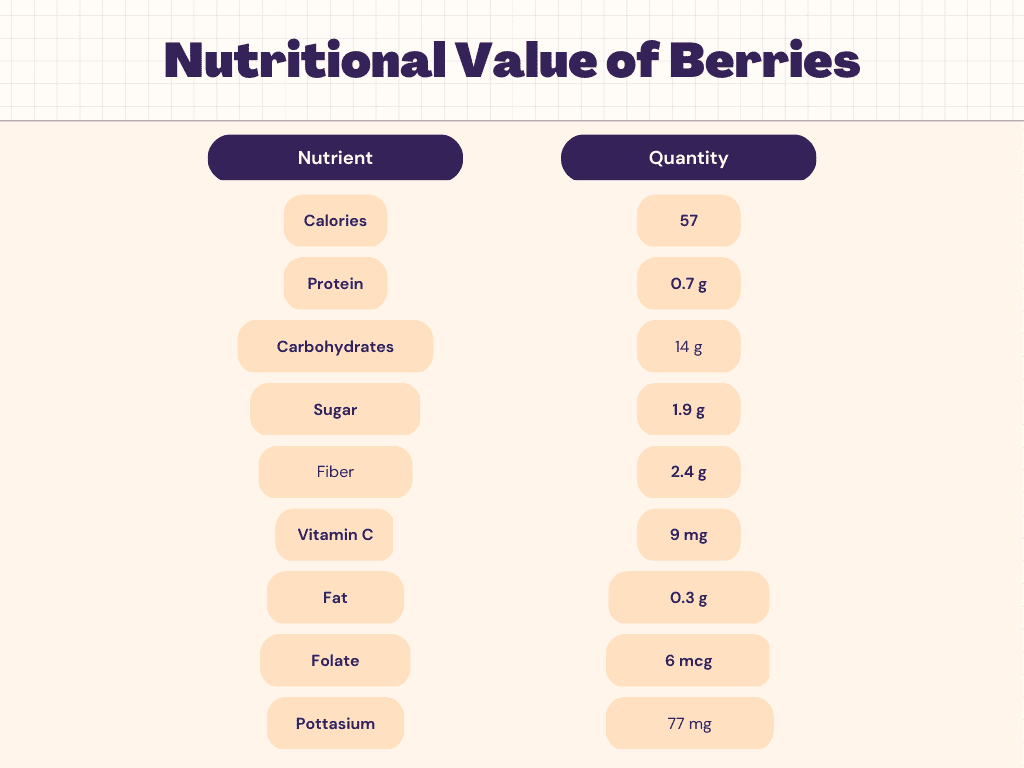In botany, a berry is a straightforward fleshy fruit with several seeds, like a banana, grape, or tomato. A berry develops from a single ovary of a single flower to become a basic fruit. The fruit wall’s middle and inner layers are frequently difficult to tell apart. Berries are one of the primary categories of fleshy fruits, along with drupes and pome fruit.
Nutritional Value of Berries
Berries are a fruit with fewer carbohydrates. They are regarded as a superfood that has a powerful nutritional punch in addition to their vibrant flavor and vivid color. Blackberries include advantageous substances that could help prevent diabetes, cancer, and heart disease.
Anthocyanins, which are found in berries, are phytochemicals that can shield cells from free radicals.
Their antioxidant strength is enhanced by their dark purple color. Additionally, a great source of fiber, vitamin C, and manganese is blackberries.
Nutritional Facts of Berries
Carbs In Berries
Blackberries have 13.8 grams of carbohydrates per cup, 7.6 of which are fiber. While a large portion of the carbohydrates in blackberries come from simple sugars like fructose, glucose, and sucrose, they also contain complex carbohydrates that are digested more slowly and have a less noticeable effect on blood sugar levels. This indicates that blackberries only have a 25 glycemic index (GI).
Fat In Berries
Blackberries have almost no fat. The monounsaturated and polyunsaturated fats that blackberries do contain are good fats that lower vascular inflammation and enhance heart health.
Protein In Berries
The protein content in blackberries isn’t all that high. Eat blueberries with Greek yogurt (17 grams per 170-gram serving) or oatmeal to help increase your protein consumption.
Health Benefits Of Berries
- Berries help in preventing and managing Diabetes – Berries are sweet, but not the kind of sweet that should make diabetes run. Because they contain fiber, people with diabetes can add them to their diet as a serving of fruit. When it comes to berries, raspberries are one of the best choices because they are full of fiber. Check out our Diabetes Plans.
- Berries help in maintaining and Losing Weight – Because of their fiber and fluid content, berries make us feel full, and feeling full is an important part of diet management. Berries are also low in calories, making them a diet-friendly choice. Raspberries have 6 calories, blackberries 65 calories, blueberries 86 calories, and strawberries 8 calories in one cup. Even if you follow a very low-carb diet, such as a ketogenic diet, you can add small amounts of fruit, such as berries. For example, 10 raspberries have 2.3 g of carbohydrates and 1.2 g of fiber. Follow our Weight Loss Plans
- Lower blood pressure by increasing blood vessel function with berries – If you’re trying to control your blood pressure, there’s good news: the anthocyanins in blueberries circulate in your bloodstream, where they can improve blood vessel function.
Vitamins & Minerals in Berries
Blackberries contain the mineral manganese and roughly half of your daily recommended intake of vitamin C in a single serving. Both are extremely powerful antioxidants that help the body get rid of free radicals and lessen the oxidative stress on cells. They accomplish this by severing the link between chemicals that would otherwise destabilize and harm cells and free radicals. In addition to being a good source of vitamin K, blackberries are also a good source of potassium, magnesium, vitamin A, iron, and calcium.
FAQs
How many Berries can I eat in a day?
Moderate consumption of berries is a simple solution. Follow the recommended serving amounts for this delicious fruit to avoid overindulging and messing up your blood glucose levels. Berries often come in serving sizes of about one cup.
Should I eat Berries before or after exercise?
Berries are rich in polyphenols, a class of plant-based antioxidants renowned for shielding your cells from harm. Additionally, polyphenols are a fantastic post-workout snack because they are proven to help reduce inflammation and muscular discomfort. But there’s more! Here are some additional ways that berries can be useful:
Anthocyanins, flavonoids that give berries their deep color, are present in berries. Anthocyanins are beneficial because they improve blood flow and lower inflammation in the muscles, especially after an especially strenuous workout.
What are the benefits of Berries?
- Berries help you stay mentally sharp
- Berries help in preventing and managing Diabetes, Follow our Diabetes plan.
- Berries help in reducing inflammation and prevent heart disease
- Berries help in maintaining and Losing Weight
- Berries help you fight urinary tract infections effectively
- Berries help you fight cancer
- Berries help in making your Gut healthy
What is the best time to eat Berries?
Berries like blueberries, strawberries, raspberries, and blackberries are a great way to start the morning. They are low in calories, high in fiber, and contain disease-fighting antioxidants.










